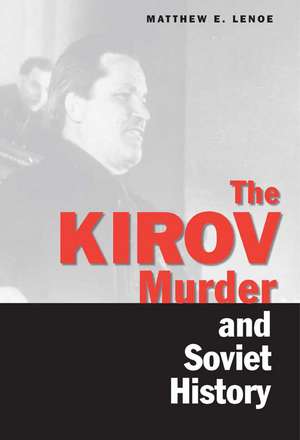The Kirov Murder and Soviet History: Annals of Communism Series
Autor Matthew E. Lenoeen Limba Engleză Hardback – 25 mai 2010
The book includes translations of 125 documents from the various investigations of the Kirov murder, allowing readers to reach their own conclusions about Stalin’s involvement in the assassination.
Din seria Annals of Communism Series
- 23%
 Preț: 505.26 lei
Preț: 505.26 lei - 23%
 Preț: 504.08 lei
Preț: 504.08 lei -
 Preț: 472.77 lei
Preț: 472.77 lei - 23%
 Preț: 503.50 lei
Preț: 503.50 lei - 23%
 Preț: 538.69 lei
Preț: 538.69 lei - 23%
 Preț: 516.82 lei
Preț: 516.82 lei - 23%
 Preț: 567.51 lei
Preț: 567.51 lei - 23%
 Preț: 464.05 lei
Preț: 464.05 lei -
 Preț: 469.29 lei
Preț: 469.29 lei - 23%
 Preț: 570.85 lei
Preț: 570.85 lei -
 Preț: 353.76 lei
Preț: 353.76 lei -
 Preț: 299.06 lei
Preț: 299.06 lei -
 Preț: 542.82 lei
Preț: 542.82 lei -
 Preț: 471.20 lei
Preț: 471.20 lei -
 Preț: 334.59 lei
Preț: 334.59 lei -
 Preț: 522.80 lei
Preț: 522.80 lei - 23%
 Preț: 440.70 lei
Preț: 440.70 lei -
 Preț: 383.11 lei
Preț: 383.11 lei - 23%
 Preț: 483.46 lei
Preț: 483.46 lei - 23%
 Preț: 522.60 lei
Preț: 522.60 lei - 20%
 Preț: 400.06 lei
Preț: 400.06 lei - 21%
 Preț: 1775.47 lei
Preț: 1775.47 lei - 11%
 Preț: 209.19 lei
Preț: 209.19 lei - 10%
 Preț: 339.60 lei
Preț: 339.60 lei
Preț: 655.22 lei
Preț vechi: 850.93 lei
-23% Nou
Puncte Express: 983
Preț estimativ în valută:
125.38€ • 131.23$ • 104.35£
125.38€ • 131.23$ • 104.35£
Carte tipărită la comandă
Livrare economică 31 martie-14 aprilie
Preluare comenzi: 021 569.72.76
Specificații
ISBN-13: 9780300112368
ISBN-10: 030011236X
Pagini: 872
Ilustrații: 12 b-w illus.
Dimensiuni: 156 x 235 x 54 mm
Greutate: 1.5 kg
Editura: Yale University Press
Colecția Yale University Press
Seria Annals of Communism Series
ISBN-10: 030011236X
Pagini: 872
Ilustrații: 12 b-w illus.
Dimensiuni: 156 x 235 x 54 mm
Greutate: 1.5 kg
Editura: Yale University Press
Colecția Yale University Press
Seria Annals of Communism Series
Notă biografică
Matthew Lenoe is associate professor of history at the University of Rochester.
Recenzii
"A grippingly constructed narrative."—Susanne Hillman, Australian Slavonic and East European Studies
"Lenoe's own investigation of the murder is the most authoritative, complete, and convincing to date. The author deserves thanks for assembling and translating the documents, and for producing a work which not only provides a masterful interpretation of the murder itself, but also sheds light on the workings of Soviet politics and vicissitudes of Soviet history more generally. While the book is aimed at the specialist, it manages at the same time to be a gripping read."—Sarah Davies, The Russian Review
Winner of the 2011 Reginald Zelnik Book Prize in History sponsored by the Association for Slavic, East European and Eurasian Studies
